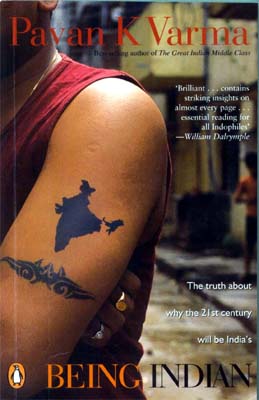Jan 28, 2026
Jan 28, 2026
Writing fiction is a different ball game from writing an essay. 'Being Indian' is an exceptionally extended essay with profound understanding and this is presented in a fairly lucid language. The book has been divided into four major chapters on the Indian's approach to 'Power', 'Wealth', 'Technology' followed by the analysis of 'Pan-Indianness' with an introduction on 'Image versus Reality and Epilogue as a 'Critical Equilibrium for Take off'. Varma's assessment of Indian conditions is unbiased, logical, frank and critical. Admirably, he never sits on any judgment but brutally honest. He is truthfully transparent about the facts and offer explanations. Most of the times it creates an impression that we are watching ourselves in a mirror little uncomfortably. In fact, Varma's critical appraisal on the Indian's so called 'spiritualism' is commendable. His categorical statement 'Indian have never been and will never be 'other worldly'. They hanker for the material goods that this world has to offer' depicts a typical Indian in his real colors. Varma does not make this statement and other similar ones just like that; he substantiates his arguments through several practical examples, anecdotes and parables. An average Indian one could visualize after reading the book will be 'an individual who be knows the power money, education, and be practical, smart, ruthless in case of emergency and also a bundle of contradictions and not absolutely ashamed of it'. Does this sound little flattering and blatantly harsh? Truths will be harsh and difficult to digest. Varma's later chapters on Technology and Pan Indianness seem to have been added to neutralize the hard facts he had discussed in the earlier chapters but explains the present milieu of consumerism, globalization and introduction of modern and western technology and culture. Nevertheless, these chapters could have been edited for brevity. The concluding remarks on population, corruption and private enterprise and on capitalizing talents sound clich'd as these have been heard umpteen times from different intellectuals. Probably, Varma wanted to conclude the book with an encouragingly positive note. The book brings out the well-read bureaucrat's wide knowledge, analytical skill and close observations and above all writing skill. After reading the book I cannot help but the feeling that hypocrisy is the biggest bane of our country, which had been camouflaged in the garb of culture. One should appreciate Pavan Varma for unveiling our pretensions poignantly and it is gratifying that some like him are also there in the society not exactly 'Being Indian'. Pavan K Varma is undoubtedly a potent writer and also an Indian. He seems to be fully aware of what it is to 'be(ing) Indian'. His book titled 'Being Indian' analyzes the Indian life, psyche and future threadbare. It says 'the book is a Truth about why the twenty first century will be India's.
Pavan K Varma is undoubtedly a potent writer and also an Indian. He seems to be fully aware of what it is to 'be(ing) Indian'. His book titled 'Being Indian' analyzes the Indian life, psyche and future threadbare. It says 'the book is a Truth about why the twenty first century will be India's.
29-May-2005
More by : G Swaminathan